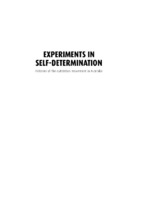Experiments in self-determination: Histories of the outstation movement in Australia
Author(s)
Peterson, Nicolas
Myers, Fred
Language
EnglishAbstract
Outstations, which dramatically increased in numbers in the 1970s, are small, decentralised and relatively permanent communities of kin established by Aboriginal people on land that has social, cultural or economic significance to them. In 2015 they yet again came under attack, this time as an expensive lifestyle choice that can no longer be supported by state governments. Yet outstations are the original, and most striking, manifestation of remote-area Aboriginal people’s aspirations for self-determination, and of the life projects by which they seek, and have sought, autonomy in deciding the meaning of their life independently of projects promoted by the state and market. They are not simply projects of isolation from outside influences, as they have sometimes been characterised, but attempts by people to take control of the course of their lives. In the sometimes acrimonious debates about outstations, the lived experiences, motivations and histories of existing communities are missing. For this reason, we invited a number of anthropological witnesses to the early period in which outstations gained a purchase in remote Australia to provide accounts of what these communities were like, and what their residents’ aspirations and experiences were. Our hope is that these closer-to-the-ground accounts provide insight into, and understanding of, what Indigenous aspirations were in the establishment and organisation of these communities.
Keywords
self-determination; autonomy; australian indigenous communities; anthropology; Aurukun; Queensland; Outstation movement; Papunya; PintupiDOI
10.26530/OAPEN_605752ISBN
9781925022896OCN
924880981Publisher
ANU PressPublisher website
https://press.anu.edu.au/Publication date and place
2016Classification
Australia
Social and cultural history
Indigenous peoples
Relating to Indigenous peoples
Social and cultural anthropology


 Download
Download Web Shop
Web Shop